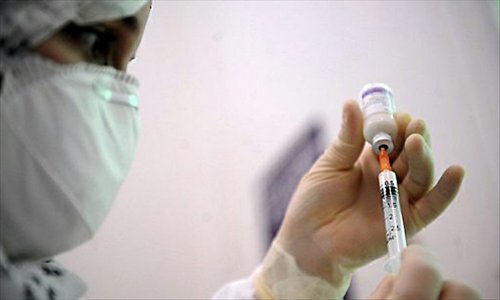Newborn vaccine scare demands urgent answers

Photo: cb.com.cn
The Chinese public is beset by a medical product safety scandal again. The latest death of an infant in Meishan, Sichuan Province, raised the death toll allegedly related to inoculation with hepatitis B vaccines to eight. Health authorities have investigated those incidents. Although the conclusions haven't been finalized yet, the public has flared up and strongly questioned the safety of domestically-made hepatitis B vaccines.
It was officially declared that all hospitals had stopped using hepatitis B vaccines made by BioKangtai in Shenzhen but the public is still upset. Some parents made calls on social media for newborns not to be vaccinated, and some were suspicious that the authorities had hesitated to publicize the information to cover up bad news.
A lot of questions need to be answered to clarify public suspicions and appease panic.
China has witnessed several healthcare product scandals in recent years. For example, melamine-tainted milk killed four children and sickened 39,965 just five years ago.
One valuable lesson we can draw from the 2003 SARS crisis is that authorities should be transparent in dealing with public health crises.
It was the first time that China experienced the severe impact of a public health incident. Authorities at the initial stage tried to cover up the breakout of the SARS virus, which only resulted in various rumors and chaos.
As for the vaccine scandal, this is not the first time that China has suffered such a crisis.
In March 2010, nearly a hundred kids were reportedly killed or became seriously ill after being vaccinated against encephalitis and hepatitis B. After that, public trust in vaccines hit a low point.
This time, the authorities need to respond quickly to public concerns and suspicions, make a thorough investigation, severely penalize those responsible for the scandal and take the chance to better regulate the whole industry.
It's also necessary to disseminate knowledge of vaccines including effects and risks. According to an online survey by Tencent after the recent vaccine scandal, 90 percent of those surveyed admitted that they have little knowledge about vaccines.
In an interview with Bloomberg, Helen Yu, a Beijing-based spokeswoman for the WHO, said, "In general, the hepatitis B vaccine is known to be safe and effective. We are confident in the ability of the China Food and Drug Administration to conduct a thorough investigation."
Let's expect the authorities to give us a satisfactory answer this time.